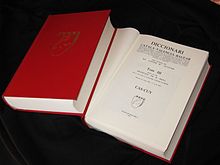Anti-Catalanism
This article has multiple issues. Please help improve it or discuss these issues on the talk page. (Learn how and when to remove these template messages)
|
| Part of a series on |
| Discrimination |
|---|
 |

Anti-Catalanism (
Description
In a historical context, anti-Catalanism expresses itself as a hostile attitude towards the
History
Italy in the Middle Ages
Historian Antoni Simon states that between the 12th and 15th centuries, the
Spain in the early modern period
In accordance with the
Persecution of Catalan in Francoist Spain

During the dictatorship of Franco (1939-1975), not only democratic freedoms were suppressed, but also the Catalan language, which was excluded from the education system and relegated to the family sphere. Castillian (Spanish) became the only language of education, administration and the media.
Rafael Aracil, Joan Oliver and Antoni Segura considered that until 1951, the persecution of the language was "total".[2] In some places students had to denounce fellow students who spoke Catalan.[2] During this period, The Catalan language was also prohibited on tombstones.[2] Between 1939 and 1943 book printing in Catalan virtually disappeared.[3]
With the defeat of Nazi Germany in 1945, the regime changed their image,[contradictory] which allowed the Orfeó Català to put on Catalan productions, and the publication of Catalan books, though only classic works; works aimed at young people were prohibited to limit the learning of the written language. Among these authors were those who returned from exile in 1942–1943. Their works include a Catalan translation of the Odyssey (1948) by Carles Riba, and research conducted by teacher Alexandre Galí with Història de les Institucions 1900-1936 (History of Institutions), which even today are reference works.
Later on, opening of the regime allowed a small change in the marginalization of the language, such as the broadcast in 1964 of the first Catalan television program on TVE (Teatre català), the Nova Cançó (New Song) (1961) movement, and the creation in 1971 of the Assembly of Catalonia, in which anti-Francoist forces were clustered, all maintained the use of Catalan, though there were limits such as the ban on Joan Manuel Serrat singing in Catalan at the Eurovision Song Contest in 1968.[4][5] In 1970, Franco's education law opened the door to the use of different languages in primary education, with another decree following in 1975. Also in 1975, near Franco's death, another decree allowed the use of other native Spanish languages in councils.
In the 21st century, some organizations and fake news blogs such as Dolça Catalunya, closely linked to the Spanish far-right and the ultra-Catholicism, have maintained and become a vehicle of anti-Catalanism and language secessionism.[6][7][8][9]
See also
- Black legend
- Lerrouxism
- Polaco (slur)
- State nation
References
- ^ "The deplorable history of the Catalans, from their first engaging in the war, to the time of their reduction. With the motives, declarations, and engagements, on which they first took arms. The letters, treaties, &c. Relating thereto". 1714.
- ^ a b c Aracil et al., Mundo actual 273
- ISBN 8472029379.
- ^ Solé, Villarroya, repressió 217
- ISSN 1764-7193.
- ^ Canela, Joan; Zaballa, Bel; Carrera, Mar; Rovira i Elisenda Laborda, Elisenda Rovira; Laborda, Elisenda (2017-03-20). "El prejudici fet notícia. Estudi Observatori del discurs d'odi als mitjans de comunicació.Estudi 2016-2017" (PDF). Grup de Periodistes Ramon Barnils (in Catalan). Barcelona.
- ^ Salvador, Xavier (2019-09-08). "Los nombres clave de 'Dolça Catalunya'" (in Spanish). Crónica Global. Retrieved 2022-07-25.
- ^ "'Dolça Catalunya': de la sátira al nacionalismo a la "agitación política radical"". Metrópoli Abierta (in Spanish). 2019-09-08. Retrieved 2022-07-25.
- S2CID 199318451.
Bibliography
- Aracil Martí, Rafael; Oliver i Puigdomènech, Joan; Segura i Mas, Antoni (1998). El mundo actual. De la Segunda Guerra Mundial a nuestros días (in Spanish). Publicacions i Edicions de la Universitat de Barcelona. ISBN 978-8483380062.
- Solé i Sabaté, Josep Maria; Villarroya i Font, Joan (1993). Cronologia de la repressió de la llengua i la cultura catalanes (1936-1975) (in Catalan). Curial. ISBN 9788472569577.
- Baydal, Vicent; Palomo, Cristian (2020). Pseudohistòria contra Catalunya. De l'espanyolisme a la Nova Història. Vic: Ed. Eumo. ISBN 978-84-9766-689-3.
